- Home
- J. G. Ballard
Super-Cannes Page 13
Super-Cannes Read online
Page 13
Only once, surprisingly, did I have a minor accident. Reversing from a cul-de-sac at Cagnes-sur-Mer, I cracked a rear brake light against a badly sited lamp standard. But the highway police who haunted the RN7 had taken off for the day, leaving me alone with the wind and the slipstream.
Three hours later I parked the Jaguar outside our villa. Dusk lay over the lakes and forest trails, and the upper floors of the office buildings seemed to drift above the autumn mist that filled the valley. I switched off the engine, and listened to the sounds of Jane showering in the bathroom. I had left the BMW near the main entrance of Eden-Olympia, and then walked across the business park to the administration building, where earlier that afternoon I had caught up with Alain Delage. Routine security checks the next morning would log the BMW’s licence number into the Cannes police computer, and soon reunite the owner with his vehicle. I regretted the irritation and anxiety I had caused him, but stealing the car had satisfied an urgent need, in some way triggered by Frances Baring and the orthopaedic mannequins at the Palais des Festivals.
I crossed the shadow-filled garden, glad that I would soon see Jane again. The water in the swimming pool was still choppy, and a pair of tights lay across a sun-lounger. After returning from her conference in Nice, Jane had stripped off and swum in the nude. I thought of her diving through the dusty surface, her pale figure bringing light to the sombre water.
I climbed the stairs, my legs exhausted after pumping the brake and clutch pedals of the BMW. I stood on the half-landing, the tights in my hand. Jane was drying herself in the bedroom, holding the bath towel behind her shoulders, her small breasts and childlike nipples flushed from the power jet, her quiff a barely visible thread. She played the towel to and fro as she pivoted on her bare feet, a matador at a naturist corrida. As I walked into the bedroom she greeted me with a flourish, and tossed the towel high into the air.
I embraced Jane, surprised by her cold skin. Over her shoulder I noticed Simone Delage standing on her balcony, face lit by the violet light of the Esterel, her eyes staring openly at Jane’s naked body.
13
A Decision to Stay
‘PAUL, CAN WE talk this through? I don’t want to upset you.’
‘Fire away.’ Croissant in hand, I looked up from the breakfast tray. ‘Do you mean last night?’
‘When?’ Buttoning her silk blouse, Jane stared at me as if I were one of her dimmer patients. ‘Where, exactly?’
‘Nothing.’ I gestured with the croissant and dripped strawberry jam over the sheet. ‘Forget it.’
‘Jesus …’ Jane pushed me aside and scraped the jam with a teaspoon. ‘Señora Morales will think you’ve deflowered me. I have a hunch she suspects we’re father and daughter.’
‘Interesting.’
‘Really? Now you tell me.’ Jane ran a hand over my scarred knee. ‘It’s inflamed a little, you’ll have to look after it. This thing last night. I thought we smoked a little pot, watched a blue movie and had a damn fine fuck.’
‘We did.’
‘Good. I waited a long time for that. Something perked you up yesterday.’ Catching sight of the Delages’ balcony, where a maid was wiping the table, she turned to me. ‘Last night? I get it … when you came in I was having a shower. I assume Simone was watching?’
‘You know she was. The only thing missing was the Toreador theme from Carmen. I hope Simone enjoyed the show.’
Jane took the croissant from me and dropped it into my coffee. ‘Who are you – Nanook of the North? I’m not some eskimo squaw covered in whale oil, handed to any Inuit who drops by for the night.’
‘I love whale oil …’ I raised my hands when Jane threatened to punch me. ‘Dr Sinclair, I’ll report you to Professor Kalman. Physical abuse of the patient.’
‘Don’t bother. He thinks you need a lobotomy. He told me you’re obsessed by car parks.’ Honour satisfied, Jane smoothed her black skirt in the mirror. ‘Anyway, you’re right. Who cares? Sex isn’t about anatomy any more. It’s where it always belonged – inside the head.’
I sat on the side of the bed and held her waist. ‘What is it you wanted to talk through?’
Jane stood between my scarred knees, hands on my shoulders, the scents of oestrogen and shower gel competing for my attention. ‘Yesterday I spoke to Kalman about my contract. They still haven’t found a permanent replacement. They’re prepared to offer a relocation bonus.’
‘For a further three months?’
‘Six, probably. I know you want to get back to London. It’s mad trying to run a publishing firm by fax and e-mail. You need to see the reps, and so on. But I’ve nothing to go back to. The work here is so interesting. We may be on to something with these self-diagnostic kits. The first hint of liver disease and diabetes, prostate cancer … You don’t realize what a single drop of blood can say about you.’
‘You sound like Adolf Hitler.’ I lay back on the bed. ‘Okay, then.’
‘Okay, what?’
‘We’ll stay. Three months, six if you want to. I know how much it means. I’ll sort things out with Charles.’
‘Paul?’ Jane sounded almost disappointed. ‘You’re a very sweet man. Nothing’s decided yet, there are endless committees …’
‘That makes sense. They don’t want another English doctor running amok.’
‘We’ll take turns flying in and out. Say, every three weekends. That way we won’t lose touch.’
‘Jane …’ I held her wrist when she tried to move away from me. ‘I’ll stay.’
‘Here? At Eden-Olympia?’
‘Yes. I’m still your husband.’
‘As far as I know. That’s wonderful, Paul.’ Pleased but puzzled, Jane dipped a finger in the jam dish. She sucked it pensively, my teenage doctor again.
We walked arm in arm to Jane’s new rented Peugeot, as the sprinklers circled and the scents of autumn lilac bathed the garden. A white detergent cloud billowed across the swimming pool, watched by Simone Delage as she prowled her balcony, sun oil in hand.
‘Mysterious soul,’ I commented as Jane waved to her. ‘Too many white Nordic nights. She’s very fond of you.’
‘I talked to her yesterday. She suggested we all do something together.’
‘That’s a breakthrough. She knows you’re married?’
‘I did mention it. What do you suppose she has in mind? Something deeply corrupt?’
‘I hope so.’
‘She thinks my striptease is a cry for help.’
I opened Jane’s door and helped to stow her briefcase, guilty that I had another day of leisure to look forward to. ‘Don’t let them work you too hard. I hope Wilder Penrose helps out with the routine stuff.’
‘He’s far too busy. He sees a constant stream of high-level people. All the CEOs and company chairmen. He has them working in therapy groups.’
‘Do they need therapy?’
‘I wouldn’t think so. They’re middle-aged men with sports injuries. Your friend Zander was in yesterday. Nasty cuts over his back and shoulders.’
‘S/M? Some of these powerful men like their chauffeurs to give them six of the best.’
‘Not Zander. He said he’d been playing touch rugby on the beach at Golfe-Juan.’ Jane closed her door and in an offhand way said: ‘You might like to know that David was treating some of the girls at the La Bocca refuge for VD.’
‘Well, it was a refuge. All the same, it does give a new slant to Alice Liddell. Sitting primly in her Victorian lace, arguing with the Red Queen, while the chancres erupt and the spirochaete burrows …’
‘Paul, you’re sick. Talk to Penrose.’
She was gone with a wave, tooting the horn as she sped down the avenue, my doctor, wife and lover again.
The last residents of the enclave had left for their offices, and only the sprinklers played over the gardens, whispering as they moved to and fro. A brief interregnum reigned before the maids arrived, during which my mind took on an almost amphetamine clarity. I lay on the jam-smeared sheet
, my head in Jane’s pillow, and felt the mould of her hips and shoulders, the faint tang of her vulva still on my hands.
Looking at the sunlight, I felt as elated as the rainbows conjured into the air by the lawn sprinklers. The insane, tearaway drive along the coast in the stolen BMW, Jane’s teasing strip for Simone Delage, and my encounter with Frances Baring had rearranged the perspectives of that virtual city called Eden-Olympia.
I sat at the dressing table and ran my fingers over Jane’s hairbrush, breathing the sweet scent of her scalp that clung to the bristles. I opened the centre drawer, a clutter of rouge-smudged cotton-wool balls, forgotten lipsticks and a Dutch cap, now home to a foil packet of cannabis resin. I loved to sift through this familiar debris of a young wife too distracted to discard anything. The contents of a woman’s dressing table were as close as a husband could ever get to her unconscious mind.
In the right-hand drawer was a leather medical valise and a copy of the Peugeot garage’s rental agreement. I scanned the debit columns, checking its arithmetic, and noted that the agreement ran for a year, with the option of a further six months’ extension.
So Jane, as I guessed, had already decided to stay on at Eden-Olympia. She had assumed that I would return to London with the Jaguar and had rented the little Peugeot, the first unilateral decision of our marriage.
Trying not to face the implications of this minor betrayal, I opened the valise, a gift from Jane’s mother. Inside was a clutter of prescription pads and a carton containing a collection of diamorphine syrettes and a dozen ampoules of pethidine. A hypodermic syringe lay inside a leather wallet, part of a cache of sedative drugs that Jane had probably found in Greenwood’s desk at the clinic and brought back to the villa for safekeeping.
Holding one of the ampoules to the light, I remembered my early career as a drug dealer during the first unsettled term at my prep school. Left alone at home with a bored au pair, I searched my mother’s bedside table. There I found a selection of slimming pills, and without thinking I swallowed several of the drinamyl tablets. Ten minutes later I was soaring around the house like a bird, my mind a window filled with light. I raced into the garden, pursued by the au pair, my feet scarcely touching the ground. Years later, when I took up gliding, I realized what had spurred me on.
The stolen tablets established my authority at school, and my mother’s repeated attempts to diet provided an unlimited supply. The older, teenage boys were experienced users of alcohol and pot, but I was the youngest dealer in the school. When my mother took herself off the contraceptive pill, in a desperate throw of the sexual dice, I at last came to grief. I squeezed the tabs from their foil wrapper and passed them off to my seven-year-old classmates as a new psychedelic. Panic followed when a senior boy explained the true role of the contraceptive pill. With a straight face he told us that the pill’s effects were reversed by the male endocrine system and we would all become pregnant …
I put away the pethidine ampoule and closed the valise. Jane’s pocket radio lay at the bottom of the waste basket. Retrieving it, I reset the batteries, and searched the waveband for Riviera News. I listened to the stream of pop music and plugs for video-rental shops and pool cleaners. Snatches of international news broke the flow, references to civil war in the Cameroons and an assassination attempt on the Israeli prime minister, but they seemed inconsequential compared with the graphic accounts of a yacht fire in the Golfe-Juan marina, or a landslip at Théoule that had cracked a swimming pool. On the new Riviera, only the trivial had any importance.
Yet David Greenwood had sat at this dressing table, perhaps with a high-powered rifle across his knees, looking out at the office buildings of Eden-Olympia. I switched off the radio and threw it back into the waste basket. I still approached the murders as if they were a momentary aberration, a paroxysm of anger in the executive washroom. To understand Greenwood I needed to think of other assassins, those deranged men who stared through the telescopic sights of their sniper’s rifles, ready to grace with their own madness the last moments of a president or a passing pedestrian. I needed to trap the ghost of the young doctor in whose bed I slept. Above all, I needed to dream the psychotic’s dream.
14
Riviera News
THE CHILDREN’S CAROUSEL rotated in the Place des Martyrs, a gilded roundabout untouched by time. A small boy sat solemnly in a miniature aeroplane, circling to the same music I had first heard thirty years earlier. Antibes never changed, perhaps the reason why Greene, who spent his life seeking change, had settled there so contentedly.
I left the Jaguar in the underground car park near the Post Office and walked through the streets of the Old Town to the Place Nationale, where the restaurant tables were laid out under the plane trees. My parents and I had eaten lunch here during a sudden cloudburst, as raindrops danced in our soup.
I found the offices of Riviera News above an outboard-motor dealers in a side street off the Avenue de Verdun. The manager, Don Meldrum, was an affable Australian with a drinker’s puffy face disguised by a tennis tan. A Fleet Street veteran of the hot-metal days, he had moved to the Mediterranean and spotted an anglophone niche among the marinas and yacht brokers.
He beckoned me into his cupboard of an office, where I sat with my back to a partition wall and my knees against his desk.
‘If you’re in pain, let out a shout. You need to be a contortionist here, and I’m not talking about the programmes.’ He pressed his head to the wall and listened to the commercial break from the adjacent studio, advertising a gourmet caterer eager to perform his magic in the smallest yacht-galley. ‘So, Mr Sinclair … you’re reporting in from the battle-front?’
‘Is there a war on?’
‘Bet on it. Eden-Olympia versus the rest of the Côte.’
‘Who’s winning?’
‘Need you ask? Whatever the physicists say, time here runs one way, head-first into the future. There’s no looking back, and almost everyone knows it.’
‘Almost?’
‘A few old-fashioned folk still think people come to the Côte d’Azur to have a good time. You and I know they come here to work. This is Europe’s California. High-tech industries, an army of people programming the future, billions surfing on a silicon chip.’
‘And once a year you have the movies?’
‘Exactly.’ Meldrum tapped his veined nose. ‘But forget about Hollywood and the Palme d’Or. I’m talking about one-man-and-a-dog operations from the Philippines. If I wanted to be accurate I’d say one-woman-and-a-dog. Now, I hear you’re a close friend of David Greenwood. Or were.’
‘To be honest, I hardly knew him. I was trying to impress your secretary.’
‘You did. She has more news sense than I do. She tells me your wife took over from Greenwood at the Eden-Olympia clinic. A nifty berth. Some say the best hospital on the coast. When Jacques Chirac sprained his thumb opening an oyster at the Colombe d’Or that’s where they took him. I hope they gave you a luxury flat.’
‘Greenwood’s old villa. Nothing else was available.’
‘Makes sense – just about. A cold lot of fish, but that’s corporate life. At least someone in the family can look after you if things go wrong.’
‘I hope nothing does.’ I waited until a timeshare commercial came to an end. ‘I’m keen to know what happened on May 28. That’s one day when something did go wrong.’
‘For Greenwood, and ten other poor sods.’ Meldrum fiddled with a transcript on his desk. ‘So you’re having a quiet rake through the ashes. Can I ask why?’
‘He was a fellow Brit. My wife knew him. I sleep in the man’s bed, eat at his breakfast table, shit in his toilet. I’d like to know the truth.’
‘Sounds like a personal crusade. Worst reason for getting involved. I take it you’ve come up with something? A diary? Confessional tapes?’
‘Sorry. But there are things that don’t add up.’
‘Such as?’
‘Motive. There isn’t one.’
‘Or one you
understand. If I were you, I’d stay close to the nearest piña colada.’
Ignoring this, I said: ‘I’ve talked to people who knew Greenwood, doctors who worked with him. No one has any idea why he went berserk. They’re not covering up, but …’
‘There’s nothing to cover up.’ Tiring of me, Meldrum stared at the Arab yachts in the harbour. ‘For once, you can believe the official story. This young English doctor, practically the Albert Schweitzer of the Côte d’Azur, was working too hard for his own good. One day a fuse blew and the lights went out.’
‘Or another set of lights came on. Brighter and harder lights that made everything seem very clear. Especially inside his own head.’
Meldrum laughed ruefully at this. ‘Mr Sinclair, you should be working for one of those concierge rags in Paris. My reporter spent a lot of time at Eden-Olympia. It was a big case. CNN, the London tabloids, all the news agencies. They found nothing.’
‘They were looking for a crime passionel among the roulette wheels. Drugs and decadent film stars. Handsome chauffeurs sleeping with the film producer’s wife … Someone at Eden-Olympia said she’d heard a report on Riviera News that mapped out Greenwood’s route. I mentioned it to your secretary.’
‘I looked it out for you.’ Meldrum pushed the transcript across the desk. ‘One of our stringers did a round-up piece. He added a few contact numbers you might find useful.’
‘It’s a big help.’ I searched the faded photocopy. ‘What’s the reporter’s name?’
‘Roger Leland. That was his last effort. He took off and moved down to the Algarve.’
I started to read the transcript, no more than three paragraphs. ‘“One minute, fifty-two seconds …”? A little on the short side?’

 High-Rise
High-Rise The Drowned World
The Drowned World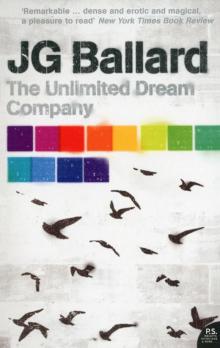 The Unlimited Dream Company
The Unlimited Dream Company Running Wild
Running Wild The Day of Creation
The Day of Creation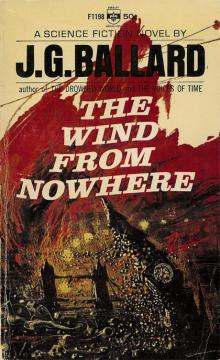 The Wind From Nowhere
The Wind From Nowhere The Complete Short Stories, Volume 2
The Complete Short Stories, Volume 2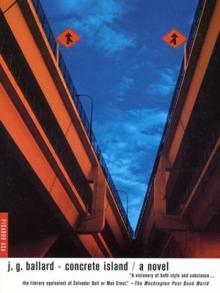 Concrete Island
Concrete Island Empire of the Sun
Empire of the Sun The Kindness of Women
The Kindness of Women Vermilion Sands
Vermilion Sands Super-Cannes
Super-Cannes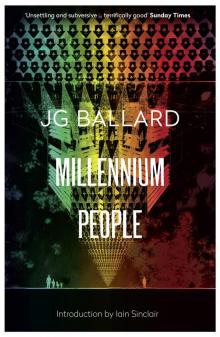 Millennium People
Millennium People The Complete Stories of J. G. Ballard
The Complete Stories of J. G. Ballard Crash
Crash The Drought
The Drought The Atrocity Exhibition
The Atrocity Exhibition The Complete Short Stories: Volume 1
The Complete Short Stories: Volume 1 Miracles of Life: Shanghai to Shepperton: An Autobiography
Miracles of Life: Shanghai to Shepperton: An Autobiography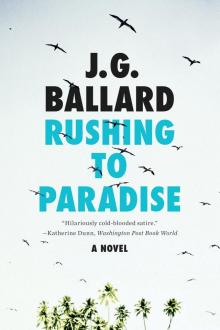 Rushing to Paradise
Rushing to Paradise Chronopolis
Chronopolis Cocaine Nights
Cocaine Nights High Rise (1987)
High Rise (1987) The Complete Short Stories
The Complete Short Stories The Day of Creation (Harper Perennial Modern Classics)
The Day of Creation (Harper Perennial Modern Classics) The Crystal World
The Crystal World